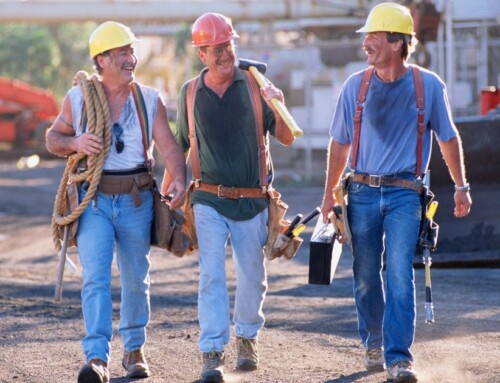Recruitment Agency for Construction
A recruitment agency for construction plays a crucial role in addressing the serious staffing crisis faced by the construction industry. Between September and December 2021, about 197,250 workers resigned each month, making it increasingly difficult for construction companies to keep enough workers while managing complex projects and tight deadlines. Finding qualified construction labor has become harder, directly affecting project delivery and timelines. Due to this challenge, specialized recruitment agencies for construction have become essential strategic partners for contractors, developers, and construction firms nationwide.
These recruitment agencies for construction connect businesses with skilled workers at all experience levels and understand the unique needs of the construction sector. Unlike general staffing firms, these specialized agencies know the details of job sites, safety rules, and the different skills needed for projects.
Key Takeaways
- Construction recruitment agencies specialize in linking businesses with skilled construction professionals across all roles and experience levels.
- These agencies help tackle the construction industry’s high turnover rate of 197,250 monthly resignations (Sept-Dec 2021).
- Staffing solutions include permanent, temporary, contract, and executive search services made for construction needs.
- Agencies provide pre-screened, quality candidates. This reduces hiring time and improves worker retention.
- National construction staffing firms work in more than 650 markets with recruiters who know the industry well.
- Benefits include larger candidate pools, better budget management, and access to both active and passive job seekers.

What Is a Construction Recruitment Agency
A construction recruitment agency is a staffing provider focused only on the construction industry. These agencies offer workforce solutions tailored to the sector’s needs. They differ from general staffing firms by deeply understanding construction processes, safety rules, trade certifications, and the skills required for each role.
Construction staffing agencies provide many services to meet different hiring needs. These include temporary and contract staffing for quick help during busy project times, permanent placements for long-term workforce growth, and executive search services for experienced leaders like project managers and superintendents.
Major construction recruitment agencies cover large areas, serving over 650 markets across the U.S. This wide reach helps companies find talent no matter where their projects are. They support everything from local builds to big infrastructure projects.
Partnership models vary by company needs. Options include temporary work for short projects, permanent hires for steady teams, and contract-to-hire that offers flexibility for both employers and workers. Many agencies also offer contingency search, a pay-on-success model where clients review candidates before hiring. These choices help construction firms find staffing solutions that fit their timelines and budgets.
The Construction Industry Staffing Challenge
The construction industry faces many workforce challenges that affect project success and profits. Besides the high turnover of 197,250 monthly resignations, the sector has an aging workforce and fewer new skilled tradespeople. Shortages are worst in licensed trades like electrical, mechanical, and heavy equipment operation. While automation is growing, it cannot replace skilled professionals.
Attracting and keeping employees in this tough market is hard. Companies need both temporary and permanent staff to meet ongoing project demands.
Skills shortages delay projects and raise costs. This causes delays, cost overruns, and more safety risks. Matching the right skills to each role is key to avoid problems and ensure good work. Construction companies often compete hard for qualified candidates. This drives wages up and makes smart recruitment important to secure top talent.
Safety and compliance add hiring challenges. Candidates must have valid training certificates, specialty credentials like OSHA 10/30 and NCCER, and pass background checks to work onsite. Construction recruiters know these rules and make the process easier.
Talent availability changes by region. Demand is high in Sunbelt states like Texas, Florida, and Arizona. Rural and remote areas often have shortages. Staffing experts keep large networks across markets to meet client needs.
Big infrastructure projects and commercial growth have increased competition for construction professionals. Construction management professionals and skilled workers often have many job options. This makes retention and attraction strategies very important for companies that want stable teams.
Types of Construction Recruitment Services
Construction staffing agencies offer several service options to meet company needs and project demands.
Permanent Placement Services
Permanent placement finds candidates for long-term roles. The process includes interviews, skills tests, and cultural fit checks. Recruiters look for candidates with the right skills who match company values.
Temporary Staffing Solutions
Temporary staffing provides quick help for short or project-based work. Agencies can fill urgent jobs within five days. This supports busy times like concrete pours, seasonal peaks, or emergency repairs. It helps companies scale their workforce without long-term commitments.
Contract-to-Hire Arrangements
In contract-to-hire, workers start as temporary with a chance to become permanent. This lets companies test fit and performance before full hiring. Workers gain a path to job security.

Executive Search Services
Executive search targets top roles like superintendents and project managers. These services use advanced tests and confidential searches. Though fees are higher, agencies reach passive candidates and experienced leaders who drive success.
Recruitment Process Outsourcing (RPO)
RPO means agencies manage the whole recruitment function. This includes onsite consultants and data analytics to forecast staffing needs and improve talent pipelines. RPO fits large companies with steady, high-volume hiring.
Managed Service Programs (MSP)
MSP is a full outsourcing model where agencies handle all temporary hiring and vendor management for large or multi-site companies. It offers centralized control, standard processes, and detailed reporting.
Construction Roles Covered by Recruitment Agencies
Agencies provide candidates for many roles, from entry-level to executives.
General Labor and Skilled Trades
These roles build the construction team’s base. They include general laborers, helpers, and skilled tradespeople like electricians, plumbers, HVAC techs, carpenters, framers, and finish workers. Heavy equipment operators like crane and dozer operators are also key.
Masonry workers, welders, and other specialists complete this group. Many need certificates and experience, so agency pre-screening is helpful.
Management and Leadership Positions
Construction management professionals lead projects. Project managers, assistant project managers, and assistant superintendents coordinate tasks. Superintendents and supervisors manage daily work. Estimators and cost analysts plan finances.
Safety managers and quality inspectors ensure standards. Executive roles like CEOs and COOs need strong experience and leadership.
Besides leaders, agencies fill technical and professional service roles.
Engineering and Professional Services
This group includes civil, structural, and mechanical engineers, architects, and designers. Inspectors and building officials enforce codes. Schedulers and planners manage timelines and resources. Business development staff drive new projects. These jobs often require advanced education and licenses.

Benefits of Using Construction Recruitment Agencies
Working with specialized agencies offers many benefits that boost efficiency and profits.
Access to Large Candidate Networks
Agencies keep vast networks of pre-screened candidates, including passive job seekers. These pools often have thousands or millions of professionals across skills and specialties. This reach is bigger than most companies can get alone.
Pre-Screening and Compliance Checks
Agencies do thorough screening, like reference checks, skills tests, drug screening, background checks, and safety training verification. They confirm candidates have certificates like OSHA 10/30 before placement. This lowers risks and keeps compliance.
Faster Hiring and Cost Savings
Agencies often fill temporary roles within five days and cut overall hiring costs. Quick hiring keeps projects on track. Studies show specialized agencies can reduce hiring costs by 15-30% versus internal methods.
Industry Knowledge and Focus
Recruiters know industry rules, trade specs, and jobsite culture. This helps find candidates who fit skills and team dynamics. It avoids costly mismatches.
Flexibility and Workforce Scaling
Agencies let companies quickly grow or shrink workforce based on project needs. Firms can adjust teams fast without admin hassles or long contracts.
How Construction Recruitment Agencies Work
Knowing the process helps companies get the most from agency partnerships.
Initial Consultation and Needs Analysis
It starts with a detailed talk about staffing needs and company culture. Recruiters work with hiring managers to set role criteria, jobsite needs, and certificates. This focuses searches on ready candidates.
Candidate Sourcing and Database Use
Recruiters use databases, networks, and referrals. AI tools match skills to jobs. Agencies keep ties with passive candidates who might be interested.
Full Screening Process
Screening includes pre-interviews, skills tests, background checks, drug tests, and certificate checks. Some agencies do site-specific tests for special needs.

Candidate Presentation and Interview Setup
Qualified candidates get detailed profiles. Agencies help with initial interviews, giving context and easing talks. This improves match success.
Hiring Help and Onboarding
Agencies assist with salary talks and onboarding steps. Many follow up to ensure smooth starts and fix issues. This boosts retention and job success.
Choosing the Right Construction Recruitment Agency
Picking the right partner needs checking key points.
Industry Focus and Expertise
Pick agencies focused only on construction. Specialized firms offer deeper knowledge, faster hires, and better candidate pools. They know details across construction sectors.
Geographic Reach and Market Presence
For multi-location work, agencies with wide reach help. National firms serving 650+ markets give steady service across regions. Mixing local knowledge with national resources is best.
Team Size and Recruiter Skill
Big agencies with 200+ specialized recruiters cover many needs. Look for teams dedicated to trades, management, and engineering. Skill links to quality and speed.
Tech and Platform Strength
Top agencies use platforms that ease sourcing, screening, and placement. Automation and data help speed hiring and keep good matches.
Pricing and Transparency
Fees vary. Contingency fees for permanent jobs run 15-25% of salary. Temporary staffing has hourly markups. Check clarity and fit with budget.
Reputation and Client Feedback
Check agency reputation via references, case studies, and stats. Good firms share success stories and retention rates. Awards can show quality.
Construction Staffing Solutions for All Sectors
Agencies serve many segments, shaping workforce plans.
Residential Construction
Projects range from custom homes to big developments. Staffing needs change by phase. Key roles are framers, carpenters, roofers, and coordinators who know residential rules.
Commercial Construction
Includes offices, retail, hotels, and mixed-use. Needs bigger teams and skilled trades. Experienced managers handle complex systems.
Industrial Construction
Facilities and refineries need heavy construction skill, process equipment, and safety. Hazardous environment certificates often required.
Infrastructure and Civil Projects
Roads, bridges, and utilities need earth moving, concrete work, and equipment operation. Government contracts require compliance and wage rules.
Institutional Construction
Schools, hospitals, and government buildings need security clearances and special training. Background checks are stricter.
Technology and Innovation in Construction Recruitment
Modern agencies use tech to improve hiring.
Digital Platforms and Automation
Platforms speed up applications, screening, and onboarding. Automation schedules interviews and manages documents. Real-time candidate info helps quick replies.
AI-Powered Candidate Matching
AI studies skills and job needs to find best fits. Machine learning boosts placement accuracy and retention.
Mobile Apps and Worker Engagement
Apps give workers instant job access, schedules, and recruiter chats. This raises engagement and quick redeployment.

Data Analytics and Workforce Planning
Analytics spot labor trends, skill shortages, and market changes. Companies use data to plan staffing, budget labor, and shape recruitment.
Virtual Interviewing and Remote Onboarding
Virtual interviews widen candidate reach and speed hiring. Remote onboarding cuts admin work and keeps compliance. These tools remain useful post-pandemic.
Cost and Return on Investment
Knowing finances helps plan staffing.
Fees and Pricing Models
Permanent placement fees are 15-25% of salary. Executive searches cost more. Temporary staffing markups vary by trade and place.
Return on Investment
Though fees are direct costs, ROI comes from faster hires, less turnover, and safer work. Quick project finish and fewer incidents offset costs.
Budgeting and Cost Control
Plan recruitment as 2-5% of labor costs. Volume deals can cut costs and give priority during busy times.
Costs of Bad Hiring
Poor hires risk safety, delays, and retraining costs. These often exceed recruitment fees. Good staffing is smart spending.
Special Programs and Services
Top agencies offer programs for industry challenges.
Veterans Hiring Programs
Programs translate military skills to construction jobs. They provide coaching and support. Veterans’ discipline and teamwork fit well in construction.
Diversity, Equity, and Inclusion
DE&I programs target underrepresented groups and meet diversity goals. Outreach, training, and partnerships help integration.
Apprenticeships and Training
Agencies work with trade schools and unions to build talent pipelines. These partnerships fight skill shortages and create career paths.
Safety Certification Support
Beyond OSHA, agencies offer extra safety training and site orientation. This lowers risks and shows commitment.
Career Development
Services for job seekers include resume help, interview prep, and counseling. These improve retention and agency ties.
FAQ
How much do construction recruitment agencies charge?
Fees are 15-25% of annual salary for permanent jobs. Temporary staffing markups range $2-8 per hour, depending on trade and location.
How fast do agencies fill construction jobs?
Temporary roles fill in about 5 days. Permanent skilled trades take 2-4 weeks. Executive jobs may need 4-12 weeks. Specialized agencies speed up hiring.
Can agencies help with urgent projects?
Yes, over 90% offer fast deployment, sometimes same-day, for emergencies. Large databases of pre-screened workers enable quick response.
What safety certificates do agency workers have?
OSHA 10/30 is standard. Many also need First Aid/CPR and site-specific credentials. Agencies check all certificates before placement.
Can agencies work with union and non-union workers?
Yes. Agencies know union rules and dispatch needs and can handle both based on client requests.
What if a placed worker doesn’t fit?
Most agencies offer replacement guarantees (30-90 days) or refunds. This lowers client risk and shows confidence in screening.
How do agencies ensure worker quality?
They use skills tests, reference checks, background screening, and ongoing performance checks. This leads to reliable hires.
Where do major staffing agencies operate?
National firms serve 650+ markets across the U.S., supporting companies with multi-state and regional projects.
Construction recruitment agencies are vital partners in today’s labor market. Their expertise, vast networks, and services meet the construction industry’s workforce needs. Using the right recruitment agency for construction helps companies save time, cut costs, and build strong teams that drive project success. Contact The Birmingham Group today to connect with top construction talent and keep yourprojects on track.






